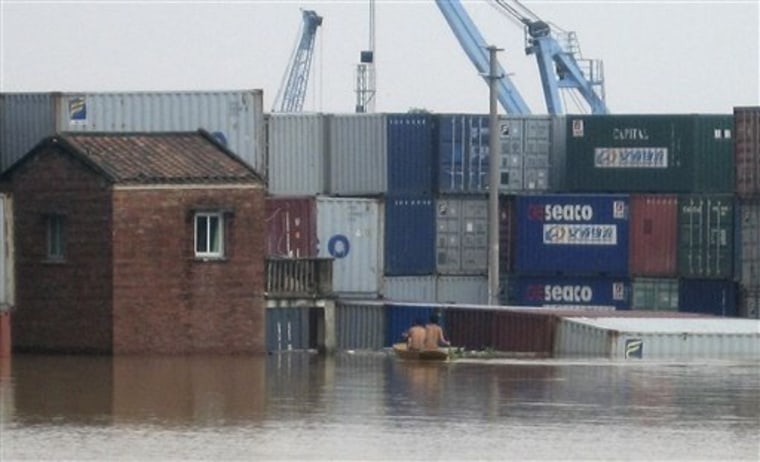Weeks of rain pushed rivers over their banks in southern China, displacing more than 1.27 million people and forcing some to huddle on rooftops Monday as the region braced for more downpours.
The floods killed 57 people, collapsed tens of thousands of homes, damaged crops across more than 2.12 million acres and caused more than an estimated $1.5 billion in economic losses.
Banana trees were almost swallowed up by the muddy chocolate brown waters of the Xijiang River that overflowed its banks in Foshan, a city in prosperous Guangdong province. Farmers ditched their plows and waded into the neck-high waters with nets to catch fish.
The Beijiang River, which converges with the Xijiang in Foshan, swallowed a neighborhood that had been home to about 100 people.
"The water came in fast. It started rising yesterday morning, and by noon our homes were swamped," said a man who gave his name as Mr. Huang, standing on a dike staring at his inundated home across the Beijiang river.
'Living on the second floor'
Residents crossed back and forth in wooden skiffs between the orange-tiled buildings.
"We're living on the second floor of the tallest building in our neighborhood," Huang said, pointing to a tall building. "We had to do the same thing during the flood in 2005, which was much worse than this one.
"The government ignored us then and it's ignoring us now," he said.
There were no signs in the area of large encampments of displaced people. Residents in multi-floor buildings appeared to have moved to higher floors, including on rooftops under tarpaulins.
State television showed troops in boats rescuing stranded people, bailing water and hastily filling sandbags to shore up dikes, but it was difficult to tell how widespread the government response has been so far.
The flooding was the third major natural calamity to strike China this year as it gears up to host the Olympics in August.
The trouble began with freakish blizzards that paralyzed southern provinces in February followed by last month's earthquake in Sichuan that killed nearly 70,000.
Still struggling from quake
Sichuan, still struggling to recover from the 7.9 magnitude quake, was among 10 provinces affected by the latest round of flooding.
But the hardest hit was Guangdong province in the Pearl River Delta, on the coast about 620 miles downstream to the east.
The industrial area is often called the world's factory floor because it is home to hundreds of thousands of manufacturers that churn out toys, computers, iPods, sneakers and a myriad of other products for the global market.
So far, most of the reported damage was in agricultural areas in Guangdong, also a large producer of rice, fruit and vegetables.
Twenty of the 57 deaths were in Guangdong, and crop damage was reported on 2.12 million acres, the official Xinhua News Agency reported. More than 1.27 million people were displaced, Xinhua and state broadcaster CCTV reported.
Economic losses have reached $1.5 billion because of the floods, the official China Daily newspaper said. It said Monday the flooding was the worst to hit the Pearl River Delta in 50 years.
"A major flood is feared if rain continues," Huang Boqing, deputy director of the Guangdong flood control and drought relief headquarters, was quoted as saying.
Forecasters were expecting the rain to continue to drench the region in the next few days, said an official at the China Meteorological Administration who refused to give his name because he is not authorized to speak to the media.
The official said thunderstorms were expected over the next two days in several provinces, including Guangdong, and that people in some areas have already been evacuated.
